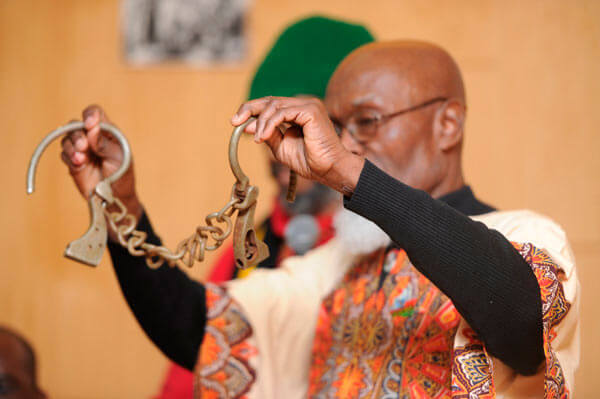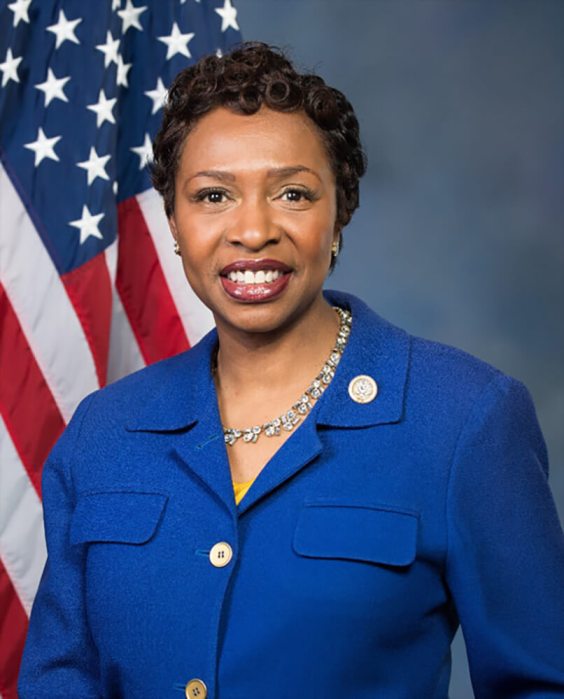A collaboration of two Africa-centric organizations in New York successfully executed an informative Black History Month program recently at Medgar Evers College that probably should have been credited as required to the semester’s curriculum.
Sons and Daughters of Jamaica and the People of the Sun Middle Passage Collective during a four-hour presentation managed a multi-media culturally engaging and enlightening mixed-bag of music, spoken word, film and award presentation with keynote addresses that informed “The Relevance of Garveyism in the Era of Trumpism” and also examined “Jamaica at the Crossroads.”
Jose Richards and Tony Akeem, the principals to collaborate the stellar month’s offering, packed education, entertainment and cultural history into one sitting and without an intermission. Akeem, a dedicated photo archivist and MEC stalwart is acclaimed for enabling Pan-African forums and discussions along with an annual flowery, memorial Tribute to the Ancestors which he orchestrates by inviting Africans to meet at ConeyIsland’s boardwalk.
Despite the uninterrupted engagement an attentive crowd remained to the end listening and sometimes learning an alternative history from traditional lesson plans.
Prior to a discussion, Richards, founder of the Jamaican collective displayed authentic shackles that restricted captured Africans during history.
Allegedly, he was gifted with the brass chain-linked cuffs by “an ancestor” he said who in deference to her family before her death entrusted him with the slave relic.
Draped in front of the red, black and green colors, Marcus Mosiah Garvey adopted to be the universal banner to represent Africans throughout the world, the weighted, metal artifact seemed a telling reminder of the pain millions suffered as captives who crossed the Middle Passage against their will.
Garvey featured prominently throughout the evening. From the screening of a documentary detailing his activities in his homeland Jamaica to his migration here and rapid rise as leader of the Universal Negro Improvement Association Inc., the film gave insight to an immigrant who mobilized African people — regardless of their geographic origin.
Significant to the proceedings was that Raymond S. Dugue, President of the Universal Negro Improvement Association /ACL Division 432 offered a retrospect on Jamaica’s history with crime. He provided updates on the latest enablers and also reflected on the origins of violence and pervasive criminal behavior which he said began after Portuguese and Spanish pirates journeyed to the African continent in order to exploit the people.
In order to secure portions to control, he said the colonials met in Europe at the Belgium conference and there decided which Africans would be ruled by British, Dutch, Portuguese, Spanish or French colonials.
Dugue contends that “they carved up” their share and with that division created dissension and violence among Africans.
His island, he said is now at the crossroads.
Ital Kofi Ital, chief of secretariat World Afrikan Disapora Union (WADU) echoed similar historic accounts apportioning responsibility to colonial nations for the state of disarray throughout many Black communities.
An intent audience listened as if transfixed by the legacy now becoming more apparent due to the steadfast commitment of Pan-African advocates and African historians.
Educators, Dr. Leonard Jeffries and his wife Rosalyn — who throughout decades have travelled extensively throughout Africa — listened with seeming approval and endorsement of the speakers’ presentation.
Tasked with delivering a message about the relevance of Garveyism in the era of Trumpism, Michael R. Duncan, President General of the UNIA spoke directly to his mentor’s contribution of Black empowerment, cooperative economics, self determination, pride, self-reliance and the One Aim, One Destiny purposeful mission of upholding African heritage and culture.
“Men in earnest are not afraid of consequences,” the 10th successor to Garvey’s global UNIA movement said. It is a statement Garvey made in response to being asked about fearing death when he was incarcerated.
“Blacks have always been suppressed,” Duncan said.
“We’ve been through this before,” he said, “Kennedy-ism, Carter-ism, Reagan-ism, Clinton-ism, Hoover-ism, all the way back to Coolidge-ism.”
He explained the Ku Klux Klan were pervasive during the presidency of Republican Calvin Coolidge. However, with racists openly declaring their bigotry and Coolidge-ism the order of the day along with his enactment of stern governance, history records that Coolidge commuted Garvey’s sentencing.
Duncan’s Coolidge parallel to Trumpism was amplified when he said Africans are often isolated.
“Trump is getting Black people to talk again for the first in a long time.”
He added that Blacks seem to relate “only when our backs are against the wall.’
In addition to helming the Pan-African association, Duncan is also the brother of the first lady of Liberia, Clar Duncan-Weah.
As an unofficial ambassador from Jamaica and Liberia Duncan said when his brother-in-law asked his involvement in the new African administration responded that he wants no role in the politics of the African nation.
An eyewitness to the ravages of the 14-year war that ravaged that nation, Duncan said his sole mission is to advance the philosophy of Marcus Mosiah Garvey.
Dressed as a soldier in Garvey’s all-African army, the Queens resident, entrepreneur, husband and father perceives hope for the youth, and is convinced that currently “the sky is the limit in Liberia.”
The celebration also featured poetic recitations from Ras Osagyefo who rendered a belated birthday tribute to Bob Marley. Combining compositions from Marley’s storied music catalogue, the compelling poet delivered a passionate ode to the Ratafarian whose 73rd birth-date was marked three days earlier.
Reggae talent Scepta added to the cultural menu by introducing some of his original compositions.
Catch You On The Inside!























